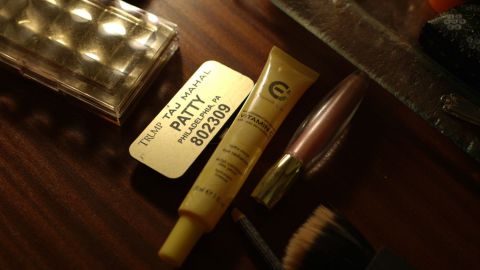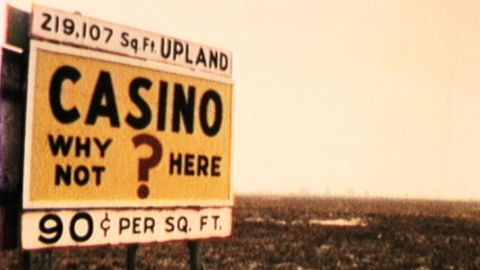This episode explores the difficult road ahead for those affected by the closing of the casinos, as we follow former workers to a welfare-to-work program, a food bank, and a sheriff’s sale. In 2016, with the casino closings, Atlantic County, NJ, had the highest rate of home foreclosures in the country.
♪♪
>> I was employed at the
Showboat Casino, Atlantic City.
I was there from March 9, 1987
to September 1, 2014.
I opened and closed the doors.
It was a lot of mixed emotions,
a lot of mixed feelings, a lot
of hugs, a lot of tears.
I still have some photographs
I have never gotten rid of, of
all of us together.
We were family.
>> I've been in the casino
industry for 34 years.
I never thought I'd be
unemployed.
>> Yeah, I got 27.
>> 27?
>> Yeah.
>> Yep, I've been doing it since
'78.
>> When the Revel closed, and I
found myself unemployed after
34 years in the casino industry,
I was depressed.
I sat on the couch for a couple
months.
I just didn't know what I was
going to do with my life.
I actually was on the computer
every day for five or six hours,
seeking employment, creating
different résumés, and I was
unable to find a position I
felt -- a full-time position
anywhere.
>> Emotionally, I probably
didn't show a lot.
Kept most of it inside.
But I spent many a sleepless
night tossing and turning,
trying to figure out what's
gonna happen next.
>> I applied for unemployment.
It's for 26 weeks only.
They don't have extensions any
longer.
>> The past year was, to start
with, six months of
unemployment, which ended in
March, which left me trying to
survive off of my retirement,
which I didn't want to use this
early.
And I'm still too young to get
Social Security.
>> Why are you here?
You're here because you are part
of a program called
Work First New Jersey, and this
is all about work.
It's about everyone getting off
of benefits permanently and
working.
So, you're one of the laid-off
workers.
>> Yes, I am.
I was working for the Revel.
I worked there from the day they
opened to the day they closed.
>> So, we have to work with you
35 hours a week, because your
TANF, which means you have
children that you're supporting.
>> I understand with the
government rules about the
35 hours a week if you're
receiving type of assistance,
but I have to take two buses to
get to the location.
And to me, sitting in a
classroom for 35 hours out of
the week is not resourceful for
me at all.
>> Okay, so, what are we doing
here?
What did they tell you?
>> We're gonna get me a job.
>> Well, we're gonna try, okay?
Obviously easier said than done.
Everything is geared towards
employment.
So, if you have interviews you
want to go to, job fairs you
want to go to, hiring events,
you're more than welcome to.
You may not, however, do that
consecutively.
So, as an example, if you did
that on Monday, Tuesday, you're
required to be here the day.
Your first goal is to earn all
of your credit.
Remain compliant with the
activity, with the system so
that you still have this
lifeline to hold onto.
>> If life had took a different
course, I wouldn't be here.
I was struck two different ways,
with the devastations of
Hurricane Sandy and the Revel
financially taking my resources
away.
I'm now forced to be dependent
on the Work First New Jersey
program.
>> My extended benefits have run
out.
We had savings.
We've used almost all of it.
>> No, I don't have any income
right now -- absolutely nothing.
If it wasn't for the food bank,
the community food bank, I don't
know what we would do.
>> You can have one box of
cereal out of the whole...
>> As a cement mason, as an
apprentice, I started off at
$17.25, and at my peak, I was
making $31.25 an hour.
Now I'm washing dishes for $8.44
an hour, part-time.
My last check for the week was
$126.
She's in a size 2 or 3.
I got the wife and the new baby.
Me and my wife would go to the
rescue mission before I step
back out on the corner and try
to sell some crack.
But, at the same time, just
knowing what you used to make...
I got, like, 20 applications
through all these casinos and
local businesses and stuff like
that.
It's just I got to get a shot.
Somebody got to give me a
chance.
Or else it's gonna keep being in
this poverty situation.
>> It used to be that I had a
garden for fun, and that's
changed now.
It's not a garden for fun.
It's a garden for subsistence.
I've had to give up my home
because I can't afford the
bills.
So, I am now living with my
girlfriend.
>> Right now we're trying to
negotiate with our mortgage
company, but it didn't really
have a lot of sympathy.
They want their money.
You signed a contract.
It's a bank.
>> 11 Sexton Drive,
Atlantic City, New Jersey.
>> I have a bid of $1,000.
Any additional bids?
Go to $1,000 going once.
Twice.
Sold.
Atlantic County is ranked number
one in the country for
foreclosures.
Every house, every property that
we sell at sheriff's sale,
that's the potential of a family
being uprooted from that home
and having to leave.
>> N.A. property post.
>> To have to put someone like
that out of their home is very
tough for our officers.
But that's something they have
to deal with every day.






